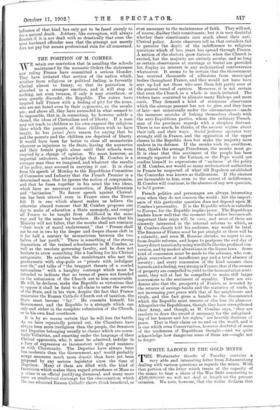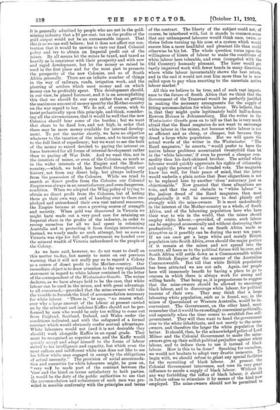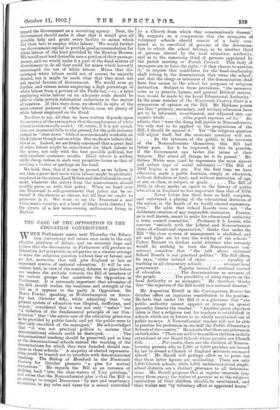WHITE LABOUR IN THE GOLD MINES. T HE Westminster Gazette of
Tuesday contains a very able and interesting letter from Johannesburg dealing with various questions as regards the mines. With that portion of the letter which treats of the capacity of the mines to bear a share of the War Debt amounting to £100,000,000 we will not deal at length on the present occasion. We note, however, that the writer declares that it is generally admitted by people who are not in the gold- mining industry that a 10 per cent. tax on the profits of the gold output would not be an unreasonable impost. That this is so we can well believe; but it does not affect our con- tention that it would be unwise to vary our fixed Colonial policy and try to obtain an Imperial profit out of the mines. By all means let the mines be taxed, and taxed as heavily as is consistent with their prosperity and with new and rapid development, but let the money so raised be used in the first place and for the most part to promote the prosperity of the new Colonies, and so of South Africa generally. There are an infinite number of things in the way of railways, roads, irrigation work, and the planting of settlers which need money and on which money can be profitably spent. This development should, in our view, be placed foremost, and it is on accomplishing this that we should fix our eyes rather than on getting the maximum amount of money spent by the Mother-country on the war repaid to her. We do not, of course, wish to insist pedantically upon this principle, and think, consider- ing all the circumstances, that it would be well that the new Colonies should bear some of the burden ; but we want that share to be fixed low, and not high, in order that there may be more money available for internal develop- ment. To put the matter shortly, we have no objection whatever to the taxation of the mines, and to taxation up to the full limit of expediency; but we want to see the bulk of the money so raised devoted to paying the interest on loans borrowed for all forms of internal development rather than to paying off War Debt. And we want this, not in the interests of mines, or even of the Colonies, so much as in the wider interests of the Empire and the Mother- country,—which, we hold, has benefited throughout our history, not from any direct help, but always indirectly from the possession of the Colonies. While we tried to snatch at direct profits from the Colonies our Colonial Empirewas always in an unsatisfactory, and even dangerous, condition. When we adopted the Whig policy of trying to obtain no direct profit from the Colonies, but of letting them go their own way, and of handing over to them un- pledged and unburdened their own vast natural resources, the Empire became at once a growing source of strength and security. When gold was discovered in Victoria we might have made out a very good case for retaining an Imperial share in the profits of the industry, in order to recoup ourselves for all we had spent in colonising Australia and in protecting it from foreign intervention. Instead, we wisely made no such attempt, but as soon as Victoria was ripe for full self-government we handed over the mineral wealth of Victoria unburdened to the people of the Colony.
As we have said, however, we do not want to dwell on this matter to-day, but merely to insist on our previous warning that it will not really pay us to regard a Colony as a source of direct profit to the Mother-country. Our immediate object is to draw attention to the very significant statement in regard to white labour contained in the letter of the correspondent of the Westminster Gazette. The writer declares, as we have always held to be the case, that white labour can be used in the mines, and with great advantage to all concerned,—provided that the mine-owners will take the trouble to furnish the kind of accommodation necessary for white labour. "There is," he says, "no reason what- ever why a large amount of the labour at present carried on by the reluctant and indolent Kaffirs should not be per- formed by men who would be only too willing to come out from England, Scotland, Ireland, and Wales under the conditions indicated, and with the safeguard of a formal contract which would obviously confer mutual advantages. Iltrhite labourers would not (and it is not desirable they should) work alongside Kaffirs in an equal grade. They must be recognised as superior men, and the Kaffir would quickly accept and adapt himself to the forms of labour suited to his intelligence and capacity, but which even the most callous and indifferent white man does not like to see his fellow white man engaged in except by the obligations of actual necessity." The provision of social accommoda- tion and amenities for white labourers might, he goes on, 'very we be made part of the contract between the Iiirer and the hired on terms satisfactory to both parties. It would be the duty of the public authorities to see that the accommodation and subsistence of such men was pro- vided in sensible conformity with the principles and terms of the contract. The liberty of the subject could not, of course, be interfered with, but it stands to common-se that any unhampered labourer would think once, twice, or thrice before turning up his nose at a system which would ensure him a more healthful and pleasant life than could otherwise be his lot. The whole question turns upon the willingness of hirers of labour to make the conditions of white labour here tolerable, and even (compafed with the Old Country) humanly pleasant. The hirer would get vastly improved work with fewer hands in many directions where white labour incontestably shows the best return, and in the end it would not cost him more than he is now called upon to pay when resorting to the uncertain native labour market."
All this we believe to be true, and of such vast import. ance to the future of South Africa that we think that the Government of the Transvaal would be perfectly justified in making the necessary arrangments for the supply of fitting accommodation for white labour. We believe, that is, that they might quite legitimately build half-a-dozen Rowton Houses in Johannesburg. But the writer in the Westminster Gazette goes on to tell us that he is very much afraid that the Rand magnates do not want to encourage white labour in the mines, not because white labour is not as efficient and as cheap, or cheaper, but because they dread a large white population. But we will quote the actual words of the writer in the Westminster. "The Rand magnates," he asserts, "would prefer to have the native labour problems accentuated twentyfold than let in the white labourer,' if even he proved a cheaper com- modity than his dark-skinned brother. The settled white labourer would quickly appreciate his rights of citizenship and apply the potency of his dreaded vote. The magnates know too well, for their peace of mind, that the latter would underlie a plain notice that Boer oligarchism is not to be replaced here by another 'close' autocracy just as objectionable." Now granted that these allegations are true, and that the real obstacle to "white labour" is the jealous dread of the Rand magnates, then most emphatically it will be necessary to deal plainly and strongly with the mine-owners. It is most undoubtedly in the interest of the Mother-country as a whole, of South Africa, and of the labouring population here who have their way to win in the world, that the mines should employ white labour,—provided, of course, such labour can be employed economically and without destroying their productivity. We want to see South Africa made as attractive as it possibly can be during the next ten years. If we can once get a large white and mainly British population into South Africa, even should the major portion of it remain at the mines and not spread into the country, all fears as to the political future will be over, and South Africa will settle down as a Commonwealth within the British Empire after the manner of the Australian Commonwealth. But till that white British population has been attracted we are not safe. Again, our people here will immensely benefit by having a place to go to oversea in which there is always work for strong and willing hands. That being so, it is preposterous to suggest that the mine-owners should be allowed to encourage black labour, and to discourage white labour, for political reasons of their own. They may think that a. large labouring white population, such as is found, say, in the mines of Queensland or Western Australia, would be in- convenient. The Government, on the other hand, must remember that it would be exceedingly convenientpohtically, and especially when the time comes to establish free self- government. They will then want to hand the government over to the white inhabitants, and not merely to the mine- owners, and therefore the larger the white population the better. It should, then, be the acknowledged policy of Lord Milner and the Colonial Government to make the mine- owners give up their selfish political prejudice against white labour, and to induce them to use it instead of black labour. How is this to be done? Speaking for ourselves, we would not hesitate to adopt very drastic measures: To begin with, we should refuse to grant any special facilities for the recruiting of black labour. At present the Colonial Government intervenes, and uses its very great influence to sect& a supply of black labour. Without in any way forbidding the influx of black labour, it should in future refuse to stimulate it by means of the kind now employed. The mine-owners should not be permitted to regard the Government as a recruiting agency. Next, the Government should make It clear that it would give all possible help and grant every facility to mines which did their best to employ white labour. We would further use Government capital to provide good accommodation for white labour of the kind provided by the Rowton Houses. We would next lend desirable men a portion of their passage- money, and we would make it a part of the fixed system of Government to do all they could for mines which honestly encouraged the use of white labour. Mines that dis- couraged white labour could not, of course, be unjustly treated, but it might be made clear that they must not ask special favours of Government. We would even go further, and release mines employing a high percentage of white labour from a portion of the Profit-tax,—i.e., a mine employing white labour on an adequate scale should be able to claim certain substantial reductions in the matter of taxation. If this were done, we should, in spite of the mine-owners' jealousy of white labour, soon see plenty of white labour employed on the Rand.
Needless to say, all that we have written depends upon the accuracy of the assumption that the employment of white labour is economically sound. Of course, if it is not sound, then our argument falls to the ground, for the gold industry cannot be shut down "while it is economically workable on black labour though not on white. But we do not believe that this is so. Indeed, we are firmly convinced that a great deal of white labour might be substituted for black labour in the mines, not only with the best possible political, but with excellent economic, results. Black labour is seldom really cheap, unless in such very primitive forms as that of carrying a basket or package on the head.
We hold, then, that if it can be proved, as we believe it MD, that a great deal more white labour might be profitably employed in the mines, Lord Milner and the Colonial Govern- ment, whatever the outcry from the mine-owners, should steadily press on with that policy. When we hand over the Transvaal to self-government that policy can be re- versed if the electors so choose, but till then we ought to persevere in it. We want to see the Transvaal a real white man's country, not a land of black serfs directed by the agents of a few mine-owning millionaires living in Mayfair.












































 Previous page
Previous page